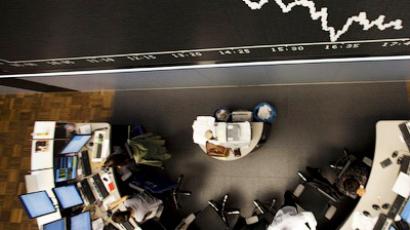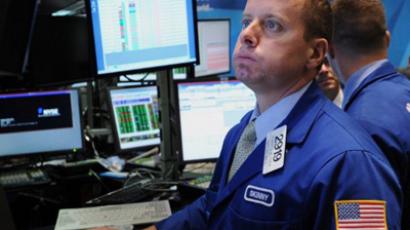Sharing the corporate registry load – Computershare

Computershare first setup a Russian subsidiary in 2003 and is looking to expand its presence in Russia. Business RT spoke with Serhiy Berezhny, CEO, Computershare Russia, about how it sees the Russian market and what its expansion plans are.
Computershare is the world largest share registry provider, originating from Melbourne Australia but now having services across the globe. Its expansion has paralleled the deregulation of global financial markets in the 1980s and 1990s which saw a massive expansion of individual share trading, and the operations of the company are seen to contribute to corporate transparency and disclosure.Its services encompass more than 100 million records providing companies with a record of who owns a stake in them, or who owns their debt, plus shareholders and bondholders with relevant information and reporting from companies. In developed markets it is often a key player in corporate communication processes, as well as corporate votes on mergers and acquisitions, mutualisations and demergers, IPOs multi-listings and capital raisings.
RT: When a company such as Computershare looks at the equity and debt trading market in Russia, and the general standard of corporate disclosure and communication with shareholders here, what does it see?SB: “During the last 20 years the Russian financial market has seen its ups and downs but overall the situation has greatly improved since the early 1990s. Quite a number of Russian companies went for public offerings, attracted foreign investors and launched their expansion to foreign markets. Though this process has been to some extent halted by the instability on the global markets, I believe the trend will continue as soon as everything is back to normal. In any case the process of integration of Russian business into the world market has been accompanied by introduction of best corporate practices, particularly in publicly traded entities. But we do see that certain survivals of past times remain in place such as unclear and undefined shareholding structures in some of the largest and most profitable companies, strong influence of the major shareholders (including the state) on the decision making process within the companies, premature legislative and infrastructural system.”RT: How does this need to change if Russia is to position itself as a greater financial centre?SB: “Russian financial market is now on the verge of fundamental infrastructural changes associated with the integration in the global market. I believe that this should be done with consideration of the experience taken from the establishment of other main financial centers such as London, New York and Hong-Kong. For us as a registrar we see the challenge in several aspects such as: introduction of unified standards for the electronic document management, elaboration of common securities safekeeping rules, enhancement of the efficiency of the information disclosure by the issuers, further technological development of industry-specific software, etc. Obviously this should be done with the help and under supervision of the state authorities, who have focused their efforts on the improvement of the regulatory regime.”RT: What is your growth outlook for the Russian market over the coming decade?SB: “Within the marketplace most people seem to be assuming growth of about 4% GDP in 2011, slowing to 3.5% in 2012, after which growth should accelerate. However, and as you will know, the world economy is very fragile now. I read recently that for a 1% drop in US GDP expect a 2% decrease in Russia. I don't know if that number is exactly right but given the resource based nature of the Russian economy it seems a reasonable conclusion.” RT: How does the existing Russian legislative framework surrounding share trading compare with others around the world for Computershare? Is it changing?SB: “Since Computershare is not involved in share trading, it is not really possible for me to comment on the legislative framework around share trading. But from my personal experience I can say that the regulatory base is quite different from other countries, but the state authorities are pushing it forward to meet the global standards. Adjusting our legislation in that sphere, we should not forget about unique patterns of the Russian securities market and about the necessity to protect local issuers’ and shareholders’ rights and interests, which is a common practice worldwide.”RT: Is the merger of the RTS and MICEX likely to have any significant impact on registry services in Russia?SB: “The merger of the RTS and MICEX is a very significant step for Russia’s securities market. The merger of both platforms should reduce transaction expenses and counterpart’s risks, and accordingly to raise the attractiveness of Russia in the eyes of the foreign investors. The other key point is that interests of all the players and shareholders must be taken into account, as well as all the pro’s and con’ of the possible consequences for the market infrastructure. In any case I believe that this is a giant step forward for Russia towards becoming one of the global financial centers.”RT: Is the increasing number of Russian companies listing, either domestically or internationally, changing the focus on registry operations and corporate communications?SB: “I am not sure that it changes the focus but it represents a good business opportunity for Computershare. Every company listing needs a registrar and there are many Russian companies listing or with the intention to list. So Russia is a good business opportunity for us.” RT: Most Russian companies – even those listed – have a majority controlling shareholder.How does this affect the focus on registry and corporate communications with stakeholders?SB: “The stakeholders’ communications and corporate governance issues are among the most important for Russian companies. As a registrar, we are responsible for the organization of the shareholders meetings for issuers, and in this area we must ensure that all our actions are in strict accordance with the highest standards of corporate governance. This also implies timely and proper support of any significant corporate actions, first with the help of our unrivaled software solutions, and second – through in-depth advice of our in-house consultants. And I am proud to say that we have successfully conducted many general shareholder meetings in the largest Russian companies.”RT: Do Russian shareholders have similar expectations of corporate communications processes as their international (particularly US, UK and Australian) counterparts?SB: “Good question and very difficult to answer. Russia does not have a well established institutional investment system as, say, in the US or UK. Most of the free float share ownership of Russian companies is owned internationally. The challenge, therefore, is for Russian companies to live up to the expectations of those overseas investors. At the same time, most sell-side coverage of Russian companies is done here in Moscow, by a group of exceptionally talented Russian analysts and most of the sales teams are here too. They are every bit as demanding as their UK/US counterparts. Communication is global. Companies cannot ignore this. To compete for capital they have to accept global standards and that is as true for communications as it is for financial disclosure, strong registry management, and just about everything else.”














